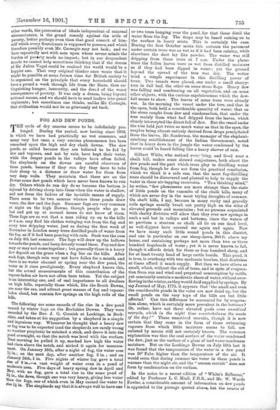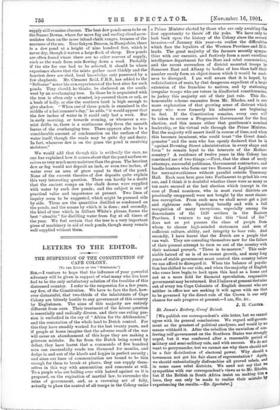FOG AND DEW PONDS. T HE cycle of dry seasons seems
to be indefinitely pro. longed. During the period, now lasting since 1893, in which we have had practically no wet summers, and many very hot ones, a very curious phenomenon has been remarked upon the high and dry chalk downs. The dew ponds, so called because they are believed to be fed by dew and vapours, and not by rain, have kept their water, while the deeper ponds in the valleys have often failed. The shepherds on the downs are careful observers of these ponds, because if they run dry they have to take their sheep to a distance or draw water for them from very deep wells. They maintain that there are on the Downs some dew ponds which have never been known to run dry. Others which do run dry do so because the bottom is injured by driving sheep into them when the water is shallow, and not from the failure of the invisible means of supply. There seem to be two sources whence these ponds draw water, the dew and the fogs. Summer fogs are very common at night on the high Downs, though people who go to bed and get up at normal hours do not know of them. These fogs are so wet that a man riding up on to the hills at 4 a.m. may find his clothes wringing wet from'the fog and every tree dripping water, just as during the first week of November in London many trees distilled pools of water from the fog, as if it had- been pouring with rain. Such was the case on July 4th last summer. The fogs will draw up the hollows towards the ponds, and hang densely round them. Fog and dew may or may not come together ; but generally there is a heavy dew deposit on the grass when a fog lies on the hills. After such fogs, though rain may not have fallen for a month, and there is no water channel or spring near the dew pond, the water in it rises prodigiously. Every shepherd knows this, but the actual measurements of this contribution of the vapour-laden air have not often been taken. Yet the subject is an interesting one, and of real importance to all dwellers on high hills, especially those which, like the South Downs, are near the sea, and attract great masses of fog and vapour- laden cloud, but contain few springs on the high rolls of the hills.
The following are some records of the rise in a dew pond caused by winter fogs on the Berkshire Downs. They were recorded by the Rev. J. G. Cornish at Lockinge, in Berk- shire, and taken at his suggestion by a shepherd in a simple and ingenious way. Whenever he thought that a heavy dew or fog was to be expected (and the shepherds are rarely wrong as weather prophets) he notched a stick, and drove it into the pond overnight, so that the notch was level with the surface. Next morning he pulled it up, marked how high the water had risen above the notch, and nicked it again for measure- ment. Qn January 18th, after a night of fog, the water rose lif in.; on the next day, after another fog, 2 in. ; and on January 24th, 1 in. Five nights of winter fog gave a total rise of 8 in.,--a vast weight of water even in a pond of moderate area. Five days of heavy spring dew in April and May, with no fog, gave a total rise in the same pond of 3i in-, the dews, though one was very heavy, giving less water than the fogs, one of which even in May caused the water to 148e in. -The shepherds say that it is always well to have one or two trees hanging over the pond, for that these distil the water from the fog. The drops may be heard raining on to the surface in heavy mists. This is certainly the case. During the first October mists this autumn the pavement under certain trees was as wet as if it had been raining, while elsewhere the dust lay like powder. The water was still dripping from these trees at 7 a.m. Under the plane- trees the fallen leaves were as wet from distilled moisture as if they had been dipped in water ; yet the ground beyond the spread of the tree was dry. The writer tried a simple experiment in this distilling power of trees. Two vessels were placed, one under a small cherry- tree in full leaf, the other on some stone flags. Heavy dew was falling and condensing on all vegetation, and on some other objects, with the curious capriciousness which the dew- fall seems to show. The leaves of some trees were already wet. In the morning the vessel under the tree, and that in the open, both held a considerable quantity of water, that on the stone caught from dew and condensation, that under the tree mainly from what had dripped from the leaves, which clearly intercepted the direct fall of dew. But the vessel under the tree held just twice as much water as that in the open, the surplus being almost entirely derived from drops precipitated from the leaves. Mr. Sanderson, the manager of the elephant- catching establishment of the Indian Government, noted that in heavy dews in the jungle the water condensed by the leaves could be heard falling like a heavy shower of rain.
Gilbert White, who noticed eve-I-I-ling, and lived near a chalk bill, makes some shrewd conjectures, both about the dew ponds and the part which trees play in distilling water from fog, though he does not form the practical conclusion, which we think is a safe one, that the most fog-distilling trees should be discovered and planted to help to supply the water in these air-tapping reservoirs. "To a thinking mind," he writes, "few phenomena are more strange than the state of little ponds on the summits of the chalk hills, many of which are never dry in the most trying droughts of summer. On chalk hills, I say, because in many rocky and gravelly soils springs usually break out pretty high on the sides of elevated grounds and mountains ; but no persons acquainted with chalky districts will allow that they ever saw springs in such a soil but in valleys and bottoms, since the waters of so pervious a stratum as chalk all lie on one dead level, as well-diggers have assured me again and again. Now we have many such little round ponds in this district, and one in particular on our sheep-down, 300ft. above my house, and containing perhaps not more than two or three hundred hogsheads of water ; yet it is never known to fail, though it affords drink for three or four hundred sheep, and for at least twenty head of large cattle beside. This pond, it is true, is overhung with two moderate beeches, that doubtless at times afford it much supply. But then we have others as small, which, without the aid of trees, and in spite of evapora- tion from sun and wind and perpetual consumption by cattle, yet constantly contain a moderate share of water, without over- flowing in the winter, as they would do if supplied by springs. By my Journal of May, 1775, it appears that ' the small and even the considerable ponds in the vales are now dried up, but the small ponds on the very tops of the hills are but little affected.' Can this difference be accounted for by evapora- tion alone, which is certainly more prevalent in the bottoms ? Or, rather, have not these elevated pools some unnoticed recruits, which in the night time counterbalance the waste of the day ?" These unnoticed recruits, though it is now certain that they come in the form of those swimming vapours from which little moisture seems to fall, are enlisted by means still not certainly known. The common explanation was that the cool surface of the water condensed the dew, just as the surface of a glass of iced water condenses moisture. But on the Lockinge Downs on July 16th last it was found that the temperature of the water in a dew pond was 20° Fahr. higher than the temperature of the air. It would seem that during summer the water in these ponds is warmer than el le night air, and the " unseen recruit " does not form by condensation on the surface.
In the notes to a recent edition of " White's Selborne," edited by Professor L. C. Minn, F.R.S., and Mr. W. Warde Fowler, a considerable amount of information on dew ponds is appended to the passage quoted above, but the source of supply still remains obscure. The best dew ponds seem to be on the Sussex Downs, where far more fog and cooling cloud accu- mulates than on the more inland chalk ranges, because of the nearness of the sea. Near Inkpen Beacon, in Hampshire, there is a dew pond at a height of nine hundred feet, which is never dry, though it waters a large flock of sheep. Dew ponds are often found where there are no other sources of supply, such as the wash from rain flowing down a road. Probably if the site for one had to be selected, it should be where experience shows that the mists gather most thickly and the heaviest dews are shed, local knowledge only possessed by a fie- shepherds. Mr. Clement Reid, F.R.S., has added to the "Selborne" notes his own experiences of the best sites for such 'inds. They should, he thinks, be sheltered on the south- west by an overhanging tree. In those he is acquainted with the tree is often only a stunted, ivy-covered thorn or oak, or a bush of holly, or else the southern bank is high enough to give shadow. " When one of these ponds is examined in the Middle of a hot Summer's day," he adds," it would appear that the few inches of water in it could only last a week. But in early morning, or towards evening, or whenever a sea- mist drifts in, there is a continuous drip from the smooth leaves of the overhanging tree. There appears also to be a considerable amount of condensation on the surface of the water itself, though the roads may be quite dry and dusty. Li fact, whenever dew is on the grass the pond is receiving Moisture."
We would add that though this is evidently the case, no one has explained how it comes about that the pond surface re- ceives so very much more moisture than the grass. The heaviest dew or fog would not deposit an inch, or even two inches, of water over an area of grass equal to that of the pond. None of the current theories of dew deposits quite explain this very interesting question. There can hardly be a doubt that the ancient camps on the chalk downs were supplied with water by such dew ponds; and the subject is one of practical value and importance at present. Two lines of inquiry seem to be suggested, which might be pursued side by side. These are the quantities distilled or condensed on the ponds, and the means by which it is done ; and secondly, the kind of tree which, in Gilbert White's phrase, forms the best " alembic" for distilling water from fog at all times of the year. We feel certain that the tree is a very important piece of machinery in aid of such ponds, though many remain well supplied without them.



























































 Previous page
Previous page